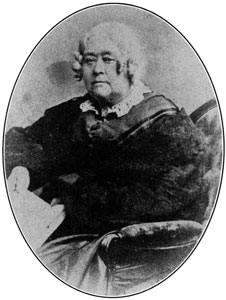IN THE WINTER 1992 issue of Tricycle, I reaffirmed one of the most cherished claims of American Buddhism. The first known translation from a Buddhist sutra into English, I wrote, was “The Preaching of Buddha,” an excerpt from the Lotus Sutra which appeared in an 1844 edition of Ralph Waldo Emerson’s Transcendentalist quarterly The Dial—translator, Henry David Thoreau. I was following a
 long tradition of scholarship, but even as the piece went to press, I had one or two unanswered questions. Then a few weeks ago, I was telecommunicating on the Internet and came across a query by an editor of Thoreau’s journals. Grabbing what seemed the purest electronic chance for some expert assistance, I sent an e-mail message to Elizabeth Witherell (of the Textual Center for the Writings of Henry David Thoreau), introducing myself and asking for help on my dates. She solved the problem, giving me the citations I needed—along with an unexpected prize. The translator wasn’t Thoreau. It was Elizabeth Palmer Peabody.
long tradition of scholarship, but even as the piece went to press, I had one or two unanswered questions. Then a few weeks ago, I was telecommunicating on the Internet and came across a query by an editor of Thoreau’s journals. Grabbing what seemed the purest electronic chance for some expert assistance, I sent an e-mail message to Elizabeth Witherell (of the Textual Center for the Writings of Henry David Thoreau), introducing myself and asking for help on my dates. She solved the problem, giving me the citations I needed—along with an unexpected prize. The translator wasn’t Thoreau. It was Elizabeth Palmer Peabody.
Elizabeth Palmer Peabody
In fact, the attribution of “The Preaching of Buddha” to Thoreau dates only from 1885, when George Willis Cooke credited him in an article about The Dial. But missed by a century of scholars was Cooke’s correction, printed in small type on a back page of the journal. This is what Elizabeth Witherell discovered.
It might have been Elizabeth Palmer Peabody herself (1804-1894) who informed Cooke of his error. In 1885, at age eighty-one and long after the Transcendentalist movement had subsided, she was still vigorously engaged in American intellectual life. The eldest child in an unorthodox and accomplished intellectual family, the young Peabody studied and worked as scholar and schoolteacher with the Unitarian preacher William Ellery Channing and the educator Bronson Alcott, and was acquainted with Ralph Waldo Emerson, Nathaniel Hawthorne (who was to marry her sister Sophia), Margaret Fuller, and other prominent American intellectuals.
In 1840 she opened a bookstore on West Street in Boston, where she sold the latest European books and periodicals and hosted gatherings of the literati. For one year of its four-year run, Peabody published The Dial from this bookshop, as well as such works as a tract against slavery by Channing and children’s books by Hawthorne. And she wrote and produced translations, including “The Preaching of Buddha,” from Eugene Burnouf’s French translation of the Sanskrit.
Part of Thoreau’s lasting reputation is due to his willingness to break with convention. Peabody was as controversial in her way; but she also played the role of the insider, active in reform movements for more than seventy-five years. In the decades after The Dial, Peabody’s work became more and more influential. She championed the causes of abolition, Indian rights, and, after the Civil War, the education of former slaves. Most of all, inspired by the German educational theorist Friedrich Froebel (who made a strong impression on the first resident Zen master in the United States, Nyogen Senzaki), Peabody made her mark in establishing kindergartens in America, teaching children and their teachers.
Peabody’s writing shows that, unlike Thoreau, she never questioned the dominant Judeo-Christian terms of nineteenth-century discussions of the spirit. Yet she has unexpected affinities with Buddhist attitudes. Her work reveals her preoccupation with discipline in both moral and intellectual education. But she repeatedly argues that if discipline is not grounded in compassion, respect, and kindness, it is mere tyranny.
Compared to subsequent efforts to make Buddhist teachings available in America, the 1844 Lotus Sutraexcerpt seems no more than a dipping of the oar into the water. But there seems to be unexpected good in the embarrassment of claiming Thoreau only to find Peabody. Perhaps we have been too ready to invest American Buddhism with the glamour and authority of Henry David Thoreau. But it would not have met the standards of Elizabeth Palmer Peabody, who wrote, “As an American then, and more—as a human being, I acknowledge no authority except the union of love and thought in practical operation.”
Thank you for subscribing to Tricycle! As a nonprofit, we depend on readers like you to keep Buddhist teachings and practices widely available.